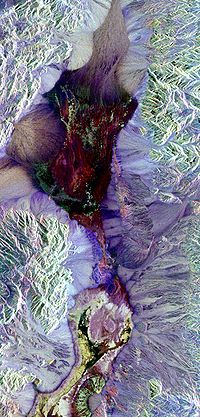
Photo from wikipedia
Oil spill detection has attracted increasing attention in recent years, since marine oil spill accidents severely affect environments, natural resources, and the lives of coastal inhabitants. Hyperspectral remote sensing images… Click to show full abstract
Oil spill detection has attracted increasing attention in recent years, since marine oil spill accidents severely affect environments, natural resources, and the lives of coastal inhabitants. Hyperspectral remote sensing images provide rich spectral information which is beneficial for the monitoring of oil spills in complex ocean scenarios. However, most of the existing approaches are based on supervised and semi-supervised frameworks to detect oil spills from hyperspectral images (HSIs), which require a massive amount of effort to annotate a certain number of high-quality training sets. In this study, we make the first attempt to develop an unsupervised oil spill detection method based on isolation forest (iForest) for HSIs. First, a Gaussian statistical model is designed to remove the bands corrupted by severe noise. Then, kernel principal component analysis (KPCA) is employed to reduce the high dimensionality of the HSIs. Next, the probability of each pixel belonging to one of the classes of seawater and oil spills is estimated with the iForest, and a set of pseudolabeled training samples is automatically produced using the clustering algorithm on the detected probability. Finally, an initial detection map can be obtained by performing the support vector machine (SVM) on the dimension-reduced data, and the initial detection result is further optimized with the extended random walker (ERW) model so as to improve the detection accuracy of oil spills. Experiments on hyperspectral oil spill database (HOSD) created by ourselves demonstrate that the proposed method obtains superior detection performance with respect to other state-of-the-art detection approaches. We will make HOSD and our developed library for oil spill detection publicly available at https://github.com/PuhongDuan/HOSD to further promote this research topic.
Journal Title: IEEE Transactions on Geoscience and Remote Sensing
Year Published: 2022
Link to full text (if available)
Share on Social Media: Sign Up to like & get
recommendations!